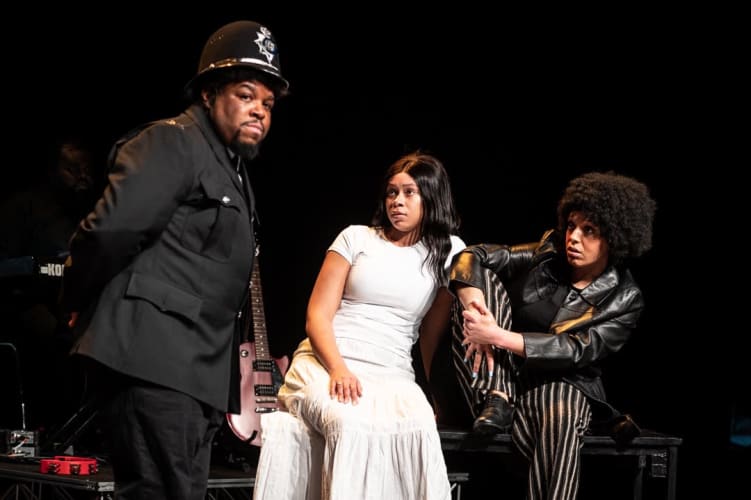Stan’s Café (pronounced 'Caff') is Birmingham’s resident experimental performance company, a bit like Forced Entertainment in Sheffield. Run principally by James Yarker and Craig Stephens, plus a floating population of associate artists, they perform but their performances aren’t always in the form of conventional theatre. Two of their longest running pieces are Of All The People In All The World, which consists of piles of rice representing various statistics, and The Commentators, in which James and Craig narrate almost any event in the style of sports commentators.
When they do write and perform a conventional play, it can have mixed results. Community Service is a conventional play and the results are decidedly mixed.
The play is based on the life of Trevor Prince, one of the first black police officers in Birmingham, who died in 2019. He was born of Windrush generation parents, he played in a gospel music group and he joined the police, so his life brought him into contact with a wide range of communities.
The programme states that the show is ‘inspired by’ Trevor Prince, but all of the characters are fictional. So the lead character is called Trevor King, not Prince. This gives the company greater artistic freedom but potentially at the cost of authenticity. The cast of five are given a ‘devised and performed by’ credit and the text is credited to "James Yarker with the company", so I assume that means the cast workshopped the material and James Yarker edited it.
The show is in two parts. Act I starts in 1970 when we see Trevor King, played by Reisz Amos, join the police and make friends with a racist white policeman (Dominic Thompson) with whom he bonds over a shared love of football and music. The white policeman is killed on duty and Trevor is powerless to save him.
After the interval, Trevor delivers a eulogy at his friend’s funeral with a moving call for forgiveness and compassion. The action then moves forward to 1985 and the Handsworth Riots. Trevor is now married to Marcia (Yasmin Dawes) and they have a daughter, Janet (Kianyah Caesar-Downer). If the priority of the Windrush generation was assimilation, Janet wants to reclaim and assert her black identity. Her mother tells her not to wear green, yellow and red rasta colour earrings and Trevor tells her not to listen to reggae, but it’s too late. The racial tension that Trevor grew up with has metastasized into a generational divide within the black community as worried parents try to protect their children.
The play ends on a hopeful note. When Trevor dies, we see on stage the unity that he worked his whole life for as black and white, young and old, dance together.
I can’t fault the show’s intentions, but dramaturgically it is all over the place. The script is written like a TV drama, so you get two minutes of largely static dialogue followed by a scene change. But whereas in film or on television the scene can change instantly, here we go to working lights while a hardworking ASM repeatedly sets and strikes a table, chairs and props.
Things improve after the interval when there is less dialogue and more music and movement, but, while there is a live band on stage, we were about fifteen minutes into the show before anyone picked up an instrument. We are told that music is important to Trevor, and Reisz Amos is a musician and singer and one of the co-directors, but this is a long way from being either gig theatre or a musical. Another co-director is the choreographer, Steady Steadman, but there is very little movement until the second half and not a huge amount of it then.
There is some back projection, but the images look like stock photos downloaded from the Internet (the online image library Alamy gets a programme credit). So when Trevor joins the police, we see a photograph of a black policeman marching in an all-white unit, and when a scene is set in his home, we see a picture of a living room. Theatre projection has come a long way, and Stan’s Café is an Arts Council, National Portfolio Organisation-funded company, so this kind of Powerpoint presentation is disappointingly weak.
The story of Trevor Prince deserves to be told, and the stage is full of talented musicians and performers who are able to tell it, but no one is playing to their strengths here. Instead, they have been shoehorned into a conventional play structure by a company that doesn’t really do conventional plays.
